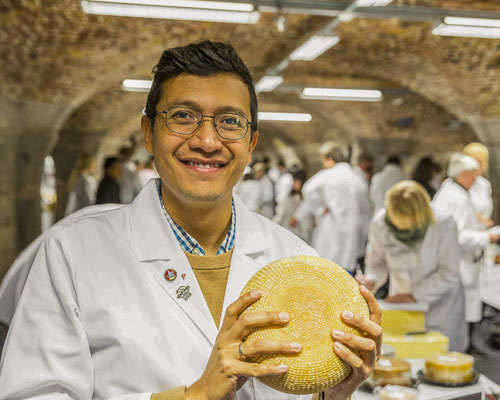When a friend needs your help, you show up, right? That’s how I feel about raw-milk cheese. If you believe cheesemakers should be allowed—even encouraged—to make cheese according to time-honored methods, then find a Raw Milk Cheese Appreciation Day event in your community and be there on Saturday, April 21.
According to an American Cheese Society survey, almost one-third of U.S. artisan and specialty cheeses are produced with raw milk—milk that has neither been pasteurized nor thermized (a step short of pasteurization). That’s more than I would have guessed. So any tightening of the FDA's current rules, which require 60 days’ aging for raw-milk cheese, would affect this industry hugely.
Carlos Yescas, program director for Oldways Cheese Coalition in Boston, has been instrumental in the fight to protect raw-milk cheese, which periodically comes under the FDA’s stern gaze. Rallying consumers worldwide in support of these traditional cheeses is the mission of Raw Milk Cheese Appreciation Day. Yescas shares some background:
What’s the trend line for raw-milk cheese production in the U.S.? Are we losing producers?
Carlos Yescas
Carlos Yescas: We don’t know yet. Before I started this job, there were no data. Our 2017 survey was useful but the sample was very limited. We do know from the survey that most raw-milk cheese producers are also making pasteurized-milk cheese. If they don’t have the quality of milk they want, they won’t make the raw-milk cheese. It’s like “let’s not pull all our eggs in one basket”—namely, raw-milk cheese—because they have uncertainty about the way the regulations are being applied.
Some raw-milk cheeses stay local. Cheese producers may be selling their one raw-milk cheese at the farmers market and sending to stores their cheeses made with pasteurized milk. That has to do with the uncertainty they feel. It feels a little more manageable than sending a raw-milk cheese to distributors.
What’s the regulatory situation now? Do you anticipate the FDA making changes to the current 60-day rule?
I don’t think we will see changes. For better or worse, the rule is something the FDA can live with. They may not be happy with it, but they know that trying to change it will get a lot of pushback. At the moment, the FDA is concerned with other things. There was recently a mandatory recall for contaminated supplements. That’s a big deal, in an industry that is not regulated. FSMA (Food Safety Modernization Act) is changing a lot of things for food producers, and FDA wants to see that implemented. So even if they don’t love the 60-day rule, I don’t anticipate that they’re going to try to change it because it’s a certain thing.
So at Oldways, we think it’s a good situation at the moment. We don’t feel that there’s space in the government to talk about science right now, and we don’t want to end up with a new rule that is not based on peer-reviewed science.
Is Raw Milk Cheese Appreciation Day gaining momentum? It is having an impact?
This is the fourth year and it’s growing internationally. Last year we had events in 15 countries; this year we anticipate 25. We had over 600 events last year, and this year I anticipate we will get to 800. In some countries, it’s like a call to arms—people thinking “we should be part of this movement.” That’s what’s happening in Russia, Ecuador and Colombia. The hardest examples are New Zealand and Australia. The rules there allow raw-milk cheese from Europe, but the permits for local production of raw-milk cheese are so onerous and expensive that there’s very little. We’re trying to figure out how to support those cheesemakers so there’s not a complete ban.
To find a Raw Milk Cheese Appreciation Day event in your community, look here.
Cheese Class: Raw-Milk Cheese 101
Saturday, April 21
SHED
25 North Street
Healdsburg, CA
1 p.m. to 3 p.m.
Join me at Healdsburg SHED for a guided tasting of some awesome American cheeses made with unpasteurized milk. Regulatory pressures are making these traditional cheeses increasingly rare. Learn why some cheesemakers insist on working with it and continue to fight for their rights when it comes to raw milk. Reserve here>




